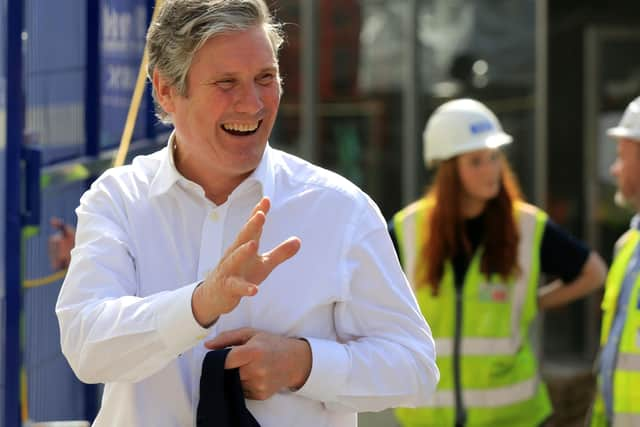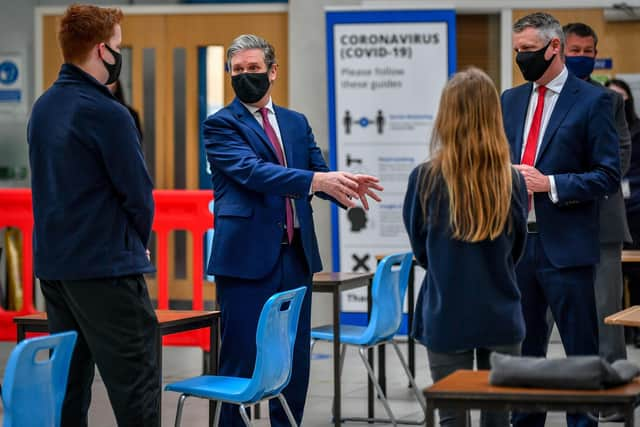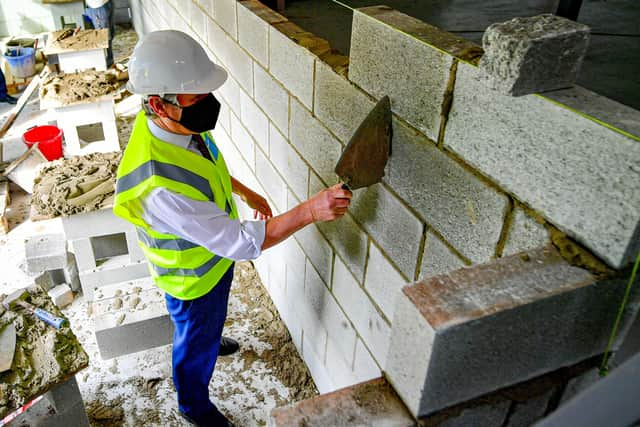Sir Keir Starmer and Labour’s uphill struggle – Bill Carmichael
So a Survation poll result this week showing the Conservative candidate with a seven point lead over Labour in the Hartlepool by-election due on May 6 no doubt raised more than a few eyebrows in the Leader of the Opposition’s office.
If the bricks in the “red wall” of normally rock solid Labour seats in the North and Midlands are still crumbling before Boris Johnson’s Conservative steam roller a full 15 months after the last general election, it will have the alarm bells ringing at Labour headquarters.
Advertisement
Hide AdAdvertisement
Hide AdLosing Hartlepool would be a shockingly bad result for Labour, and already those on the left of the party are sharpening their knives and arguing that Starmer’s “centrist” attempt to win back working class voters with patriotic appeals to “flag and family” have failed.


But there are a number of reasons to treat the latest poll with caution, not least because the sample size was relatively small and we are still a month away from the actual voting day.
It is also worth remembering that Labour only held on to the seat in 2019 because the Brexit party split the anti-Labour vote. Between them the Conservative and Brexit Party candidates garnered more than 22,000 votes in Hartlepool, dwarfing the winning Labour candidate’s total of 15,464.
The Brexit Party, now rebranded as Reform UK, is unlikely to attract the same level of support this time around, and at least some of these votes will break for the Conservatives.
Advertisement
Hide AdAdvertisement
Hide AdTo add to Labour’s troubles, the Conservatives, and Boris Johnson in particular, are currently enjoying something of a “vaccine bounce” in popularity following the highly successful rollout of the immunisation programme to combat Covid-19, with more than 37 million doses administered and infection and death rates plummeting.


So perhaps a Conservative victory next month in Hartlepool wouldn’t be a total shock, but either way both Labour and the Government should not read too much into this one result.
For both leaders, Starmer and Johnson, the last 12 months have been dominated by the extraordinary events of the pandemic and they both deserve the chance to prove themselves in more normal times.
The Conservatives are enjoying a consistent lead in the polls, but they should be aware that the “vaccine bounce” in popularity won’t last forever.
Advertisement
Hide AdAdvertisement
Hide AdVoters generally don’t offer much gratitude to politicians, and by the time the next general election comes around the events of 2020 and 2021 will seem like ancient history to many.


As for Labour, I don’t see they have much choice but to stick with Starmer, even if Hartlepool does fall. The sharp lurch to the left under Corbyn proved to be an unmitigated disaster, and I can’t see the party repeating that experiment again any time soon.
And if not Starmer, the question is who else? Talent is spread pretty thinly on the Labour benches at the moment and it is a struggle to think of any credible alternative leader. Certainly there is no big beast waiting in the wings, as there was with Gordon Brown in the final years of Tony Blair’s premiership.
Of course the big test is probably still some way off. According to the Fixed Term Parliaments Act, the next general election should take place on May 2, 2024. But the Government has pledged to repeal this Act, and the date of the election could be pushed back as far as December 2024.
Advertisement
Hide AdAdvertisement
Hide AdBetween then and now a lot will happen, not least with the Covid pandemic and the repercussions of Brexit. But if we do return to more normal political times the key driver in people’s voting intentions is likely to be the economy.
According to conventional wisdom, if the economy bounces back rapidly after the ending of the lockdown, and if jobs are plentiful and wages rise in the next few years, then people will vote accordingly.
After the tribulations and extraordinary events of the last 12 months, it will be good to get back to ordinary, normal politics.
Support The Yorkshire Post and become a subscriber today. Your subscription will help us to continue to bring quality news to the people of Yorkshire. In return, you’ll see fewer ads on site, get free access to our app and receive exclusive members-only offers. Click here to subscribe.
Comment Guidelines
National World encourages reader discussion on our stories. User feedback, insights and back-and-forth exchanges add a rich layer of context to reporting. Please review our Community Guidelines before commenting.